|
|
|
Sort Order |
|
|
|
Items / Page
|
|
|
|
|
|
|
| Srl | Item |
| 1 |
ID:
153445
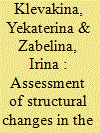

|
|
|
|
|
| Summary/Abstract |
The authors examine the transformation of the reproduction structure in Russian and Chinese regions engaged in cross-border interaction, which is a timely problem in the light of Russian geopolitical interests. More attention is paid to an analysis of the changes taking place in the structure of the employment of Russia's regional population.
|
|
|
|
|
|
|
|
|
|
|
|
|
|
|
|
| 2 |
ID:
155341
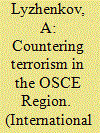

|
|
|
|
|
| Summary/Abstract |
THE HEINOUS ACTS OF TERROR in the first few months of the current year, indiscriminate slaughter of civilians, persecution of whole communities (particularly on the grounds of religion or belief), metro bombings, and terrorist attacks against major European cities continue to shock and horrify. Is it possible to take effective action against such atrocities? What can be done to prevent the assassination of an ambassador or a grenade launcher attack on a consulate general?* How can we enable people to travel by public transport, attend public events, and meet with friends in cafés and restaurants without fearing for their lives or for the lives of their children, friends and relatives?
|
|
|
|
|
|
|
|
|
|
|
|
|
|
|
|
| 3 |
ID:
169515
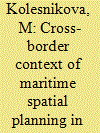

|
|
|
|
|
| Summary/Abstract |
USE OF THE SEA in the modern era is marked by the widespread use by coastal states of maritime spatial planning (MSP). In 2014, almost 40 countries developed or implemented territorial plans for delimiting offshore zones within national EEZs (exclusive economic zones*) and determining their industrial purpose. This practice is employed by states all over the world, including Australia, Israel, Canada, New Zealand, Norway, China, the U.S., the EU member states, as well as several other countries in Africa, Asia, Oceania, North and Central America [8, pp. 14 18].
|
|
|
|
|
|
|
|
|
|
|
|
|
|
|
|
| 4 |
ID:
167135
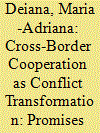

|
|
|
|
|
| Summary/Abstract |
Can we continue to view European Integration as a project associated with conflict transformation and peacebuilding through the promotion of soft borders and cross-border cooperation? Or are we faced with yet another sign that the European Union (EU) has reached its limits? (Balibar 2015Balibar, É. 2015 November. Europe at the limits. Interventions 1–7. doi:10.1080/1369801X.2015.1106966.
[Taylor & Francis Online] , [Google Scholar]
; Bhambra 2015Bhambra, G. K. 2015 November. Whither Europe?: Postcolonial versus neocolonial cosmopolitanism. Interventions 1–16. doi:10.1080/1369801X.2015.1106964.
[Taylor & Francis Online] , [Google Scholar]
)
|
|
|
|
|
|
|
|
|
|
|
|
|
|
|
|
| 5 |
ID:
078783


|
|
|
|
|
| Publication |
2007.
|
| Summary/Abstract |
The main aim of this article is to examine the role-perception and operation of European Commission officials towards Northern Ireland and the peace process. A relative gap in the theoretical literature, until recently, on the Commission's endogenous preferences is highlighted. The main conclusion is that the European Commission's preferences towards conflict resolution in Northern Ireland have altered since 1994 and that Commission officials exhibit a greater analytical understanding and proactive approach to Northern Ireland. The cause of this change has not been socialization into `European' supranational norms, but instead has reflected the impact of British and Irish cooperation and agreement.
|
|
|
|
|
|
|
|
|
|
|
|
|
|
|
|
| 6 |
ID:
145419
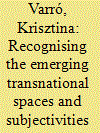

|
|
|
|
|
| Summary/Abstract |
Recently proliferating practice- and people-centred accounts have offered useful insights on cross-border regionalism and cooperation in the European Union. However, the assumption of these studies concerning the dominantly national character of people’s ‘spatial socialisation’ and practices has produced a subtle but problematic bias towards nation-state (re)bordering and, relatedly, has implied a lack of recognition for the formation of transnational subjectivities and spaces. Inspired by fieldwork observations made in the Dutch-German-Belgian borderlands, the aim of this paper is to sketch a research agenda that comes to grips with the emerging transnational dimension of cross-border cooperation. Key to this agenda is the reconsideration of the notion of practice so as to acknowledge that cross-border cooperation entails simultaneous rebordering and debordering processes and is constituted through situated and embodied actions. The paper discusses discourse theory and practice theory as two useful perspectives for such a rethinking and outlines the key methodological implications for future research on cross-border cooperation.
|
|
|
|
|
|
|
|
|
|
|
|
|
|
|
|
| 7 |
ID:
189306
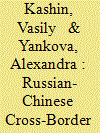

|
|
|
|
|
| Summary/Abstract |
Cross-border cooperation between Russia and China is not only an important part of bilateral cooperation but also a stimulus for the accelerated development of frontier territories. Studies of its results over the past 30 years allow us to trace institutional changes in both countries, as well as general trends in their foreign trade and investment activity. The current state of Russian-Chinese cross-border cooperation is mainly characterized by gradually waning interest on both sides, which belies the growing number of state programs, framework agreements, and initiatives with major political support. China is increasingly cautious about transit benefits and prospects of industrial cooperation at the local level due to the small market capacity of the Russian Far East and its underdeveloped infrastructure. Both countries are displaying distrust, bilateral projects are becoming increasingly uncoordinated, their implementation is delayed, and the results are contrary to expectations. To understand the reasons for this imbalance, the authors consistently analyze the main dimensions and indicators of Russia-China cross-border cooperation, the specifics of the current legal and institutional framework, as well as the results of a number of state programs and major bilateral projects.
|
|
|
|
|
|
|
|
|
|
|
|
|
|
|
|
| 8 |
ID:
069087
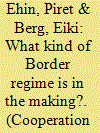

|
|
|
|
|
|
|
|